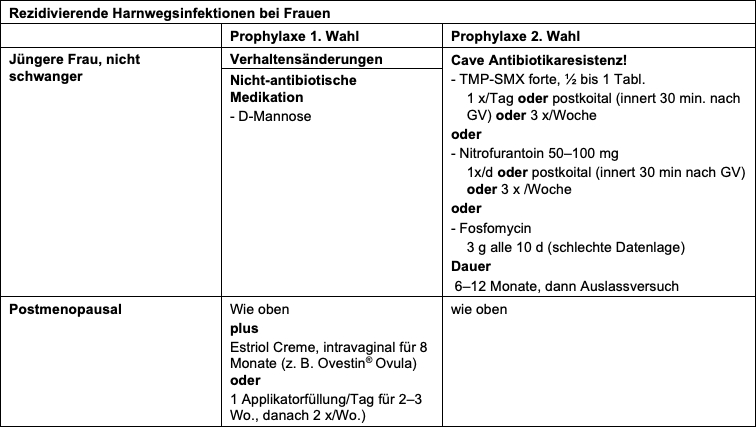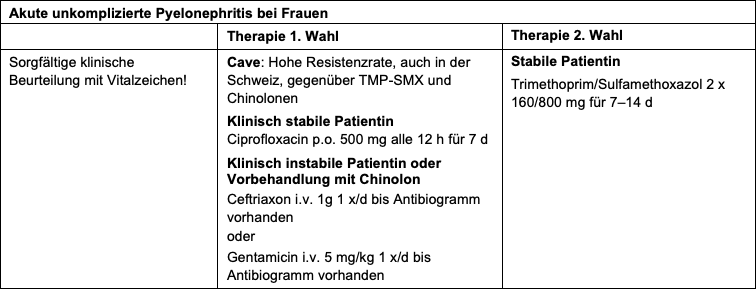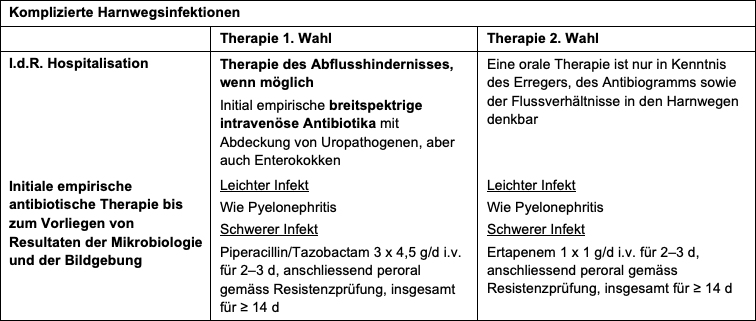- Bei Männern ohne neurogene Blasenstörung mit Dysurie/Pollakisurie, ohne Anhaltspunkte für eine Infektion ausserhalb der Blase, ohne Fieber und ohne anamnestische oder klinische Risikofaktoren kann von einem unkomplizierten HWI ausgegangen werden
Urethritis
Akute (unkomplizierte) Harnwegsinfektion ohne Hinweise auf Prostatitis oder Pyelonephritis
1. Wahl
- TMP-SMX forte 2 x 1/d für 7 d bei afebrilen Patienten, 14 d bei febrilen Patienten
2. Wahl
- Ciprofloxacin 2 x 500 mg/d, für 7 d bei afebrilen Patienten, 14 d bei febrilen Patienten
oder
- Nitrofurantoin 2 x 100 mg/d für 7 d (off-label, eher für wenig kranke Patienten geeignet)
Akute Harnwegsinfektion mit möglicher Beteiligung der Prostata
1. Wahl
- TMP-SMX forte 2 x 1/d
- Für 2–3 Wochen bei V. a. akute Prostatitis
- 4 (–6) Wochen bei V. a. chronische bakterielle Prostatitis
2. Wahl
- Ciprofloxacin 2 x 500 mg/d p.o. für 2–3 Wochen
Unkomplizierte Pyelonephritis
1. Wahl
Stabiler Patient
- Ciprofloxacin p.o. 500 mg alle 12 h für 7 d
Instabiler Patient oder Vorbehandlung mit Chinolon
- Ceftriaxon i.v. 1g 1 x/d bis Antibiogramm vorhanden oder Gentamicin i.v. 5 mg/kg 1 x/d bis Antibiogramm vorhanden
2. Wahl
Stabiler Patient
- Trimethoprim/Sulfamethoxazol 2 x 160/800 mg für 7–14 d
Akute (bakterielle) Prostatitis
Schwer kranker Patient
- I. d.R. i.v. Therapie, stationär
- Beginn mit empirischer Therapie (Co-Amoxi i.v. plus Gentamycin i.v.) bis Kulturresultat da ist
oder
- Piperacillin-Tazobactam 3 x 4,5 g/d ggfls. Carbapenem bei V. a. ESBL (extended-spectrum Betalaktamase-bildenden E. coli)
Klinisch stabiler Patient
1. Wahl
- Wenn möglich Chinolone als empirische Therapie meiden, solange Mikrobiologie nicht vorliegt
- Ceftriaxon i.v. 1 x 2 g/d bis Mikrobiologie vorliegt
2. Wahl
- Ciprofloxacin 2 x 500 mg/d p.o. für 2–3 Wochen



